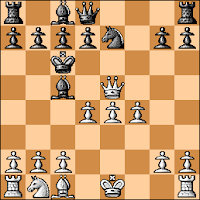The other day I played a 2 12 blitz Jerome Gambit game, checkmating my opponent in 15 moves. A simple thing? Hardly. With the help of Houdini, afterwards, I discovered that my opponent and I had missed a whole lot.
perrypawnpusher - ficshicks
blitz 2 12, FICS, 2014
1.e4 e5 2.Nf3 Nc6 3.Bc4 Bc5 4.Bxf7+
4...Kxf7 5.Nxe5+ Nxe5 6.Qh5+ Ke6 7.Qf5+ Kd6 8.f4 Ne7
This is not Black's strongest defense.
An error by the defender, especially in an opening as sketchy as the Jerome Gambit, is a gift. The attacker should know what kind of gift that it is, and respond accordingly. In this case, it is important to realize that White can regain his sacrificed material, but that Black can find safety for his King.
9.Qxe5+
At this point, Black resigned in perrypawnpusher - ktonthat, blitz 10 5, FICS, 2009.
9...Kc6
Here, Black resigned in perrypawnpusher - Greystroke, blitz, FICS, 2012.
10.d4
I had forgotten that 10.Qc3 is the right move here, because a past opponent and I quickly left the path with 10...Qf8 11.d4 Qf6 12.Qxc5 checkmate, perrypawnpusher - nicolasalk, blitz, FICS, 2009.
Instead of expanding his pawn center, and dreaming of checkmate, White should think of pinning and winning the Black Bishop after 10...b6 11.b4 d6 12.d4 Kb7 13.bxc5 dxc5 14.dxc5 Nc6 when Black's King is safe, and White is ahead a couple of pawns.
Even at that point, White should modestly play 15.0-0, instead of grabbing more matrial with 15.cxb6 axb6 16.Qxg7 because of 16...Rg8 17.Qc3 Rxg2 when Black would be winning!
10...Bd6
Stronger was 10...d6, as in perrypawnpusher - vypux, blitz, FICS, 2009 (1-0, 20). In that game I was able to get away with 11.Qxg7 because my opponent missed 11...Nf5! 12.exf5 Qe8+ 13.Kd1 Bxf5 after which, if anything, Black would have an edge, despite his two-pawn deficit. Note that 14.dxc5? now would be crushed by 14...Qh5+ Instead White should try the sharp 14.d5+!? when Black would be prudent to reply 14...Kb6,
analysis diagram
with in an unclear position where White's King is in more danger than his counterpart, and Black's 2 Bishops and better Rooks give him the more threatening prospects.
Also, 10...Bb4+ 11.Nc3 (11.c3 is better) appeared in perrypawnpusher - TheChessInnovator, blitz, FICS, 2008 (1-0, 43).
(Having played the line 5 times previously, and apparently having learned very little in the process, I am reminded of the Firesign Theater album, "Everything You Know Is Wrong"!)
11.d5+ Kb5
Safer was 11...Kb6 when after 12.Qc3 White has to develop and make threats against the enemy King while taking advantage of Black's trapped (thanks to the Knight on e7) Bishop. Black can, in some situations, consider returning his Knight instead with a well-timed ...Nxd5 followed by a Bishop retreat. Houdini puts White's advantage at less than a pawn, and shows no direct checkmates.
12.Na3+
This move was based on the simple idea 12...Bxa3 13.bxa3 and then White will have the use of the b-file for a winning attack on the enemy King.
However, after the game Houdini pointed out that after 13...Ka6 there is no "winning attack on the enemy King" and that all White has left is 14.Qxg7 Rg8 15.Qd4 b6 (Not 15...Rxg2 right off because 16.Qa4+ Kb6 17.Rb1+ Kc5 18.Qb4#) 16.0-0 when Black's King escapes with 16...Kb7 and the game is about even.
Instead 12.Qd4 was the move to make, and then White's threats against Black's Bishop and King would give him the advantage, although it would still be a long time before the game would be decided.
12...Kb6
As suggested above, 12...Ka6 would again leave White with little more than 13.Qxg7 when 13...b6, 13...Ng6 or 13...Re8 (followed by 14.0-0) all look about even.
13.Nc4+
[to be continued]








 4...Kxf7 5.Nxe5+ Nxe5 6.Qh5+ Ke6
4...Kxf7 5.Nxe5+ Nxe5 6.Qh5+ Ke6 7.Qf5+ Kd6 8.f4 Ne7
7.Qf5+ Kd6 8.f4 Ne7 



 Jerome Gambit 101.
Jerome Gambit 101. 7.Qf5+ Kd6 8.f4 Ne7
7.Qf5+ Kd6 8.f4 Ne7  Last seen in my game against TheChessInnovator (see "
Last seen in my game against TheChessInnovator (see "



















